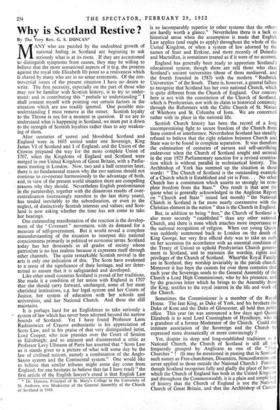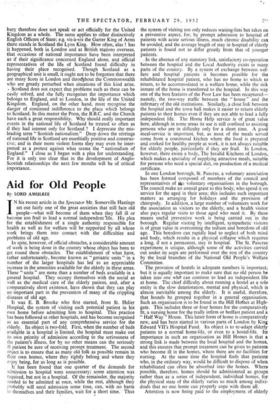Why is Scotland Restive?
By The Very Rev. G. S. DUNCAN* MANY who are puzzled by the undoubted growth of national feeling in Scotland are beginning to ask seriously what is at its roots. If they are accustomed to distinguish symptoms from causes, they may be willing to believe that the more sensational aspects of it (e.g. the protests against the royal title Elizabeth II) point to a restiveness which is shared by many who are in no sense extremists. Of the con- troversial issues of the present situation I have no desire to write. The first necessity, especially on the part of those who may not be familiar with Scottish history, is to try to under- stand; and in contributing this "prelude to understanding" I shall content myself with pointing out certain factors in the situation which are too readily ignored. One possible mis- understanding I must remove at the outset. Scottish loyalty to the Throne is not for a moment in question. If we are to understand what is happening in Scotland, we must put it down to the strength of Scottish loyalties rather than to any weaken- ing of them.
After centuries of unrest and bloodshed Scotland and England were in 1603 united under one Sovereign, King James VI of Scotland and I of England; and the Union of the Crowns prepared the way for the more complete Union of 1707, when the Kingdoms of England and Scotland were merged in one United Kingdom of Great Britain, with a Parlia- ment meeting in London. Now, two and a half centuries later, there is no fundamental reason why the two nations should not continue to co-operate harmoniously to the advantage of both, and, in view of the present world situation there are compelling reasons why they should. Nevertheless English predominance in the partnership, together with the disastrous results of over- centralisation (increasingly manifest in the last thirty years), has tended inevitably to the subordination, or even to the neglect, of distinctively Scottish interests and values; and Scot- land is now asking whether the time has not come to take her bearings.
One outstanding manifestation of the reaction is the develop- ment of the " Covenant " movement, with its demand for a measure of self-government. But it would reveal a complete misunderstanding of the situation to interpret this national consciousness primarily in political or economic terms. Scotland today has her thousands in all grades of society whose patriotism is no less zealous because it expresses itself through other channels. The quite remarkable Scottish revival in the arts is only one indication of this. The Scots have awakened to a sense of the significance of their heritage, and are deter- mined to ensure that it is safeguarded and developed. '
Like other small countries Scotland is proud of her traditions. She made it a condition of her union with England in 1707 that she should carry forward, unchanged, some of her most cherished institutions, e.g. her legal system and her Courts of Justice, her system of education with her schools and universities, and her National Church. And these she still maintains.
It is perhaps hard for an Englishman to take seriously a system of law which has never been adopted beyond the narrow bounds of Scotland. Yet I have found Professor Leon Radzinowicz of Cracow enthusiastic in his appreciation of Scots Law, and in his praise of that very distinguished jurist, Lord Cooper, who now presides over the Court of Session in Edinburgh; and so eminent and disinterested a critic as Professor Levy Ullmann of Paris has asserted that " Scots Law• as it stands gives us a picture of what will some day be the law of civilised nations, namely a combination of the Anglo- Saxon system and the Continental system." One would like to believe that similar tributes might some day come from England; for one hesitates to believe that (as I have read) "the first article of the English lawyer's creed is that English Law * Dr. Duncan, Principal of St. Mary's College in the University of St. Andrews, was Moderator of the General Assembly of the Church of Scotland in 1949. is so incomparably superior to other systems that the others are hardly worth a glance." Nevertheless there is a lack of historical sense when the assumption is made that English Law applies (and ought to apply) throughout the whole of the United Kingdom, or when a system of law adorned by the names of Stair and Erskine, and more recently of Dunedin and Macmillan, is sometimes treated as if it were of no account.
England has generally been ready to appreciate Scotland's educational system, though there are still those who class Scotland's ancient universities (three of them mediaeval, and the fourth founded in 1583) with the modern "Redbrick Universities " of the South. There is, however, a general failure to recognise that Scotland has her own national Church, which is quite different from the Church of England. Our concern here is not with the constitution of the Church of Scotland, Which is Presbyterian, nor with its claim to historical continuity through the Reformers with the Celtic Church of St. Ninian of Whithorn and St. Columba of Iona. We are concerned rather with its place in the national life.
Scottish Church history has been the record of a long uncompromising fight to secure freedom of the Church from State control or interference. Nevertheless Scotland has steadily refused to believe that the right relation between Church and State was to be found in complete separation. It was therefore the culmination of centuries of earnest and self-sacrificing endeavour when the Church of Scotland sought and secured in the year 1925 Parliamentary sanction for a revised constitu- tion which is without parallel in ecclesiastical history. The Archbishop of York has summed up the situation in these words: "The Church of Scotland is the outstanding example of a Church which is Established and yet is Free. . . No other Church has a constitution which asserts so strongly its com- plete freedom from the State." One result is that now (to quote what is generally acknowledged in the Anglican Report on "Church and State" issued last month) "the National Church in Scotland is far more nearly coextensive with the Christian element in the nation" than is the Church in England.
But, in addition to being "free," the Church of Scotland is also more securely " established " than any other national Church, and there is none which attaches more importance to the national recognition of religion. When our young Queen was suddenly summoned back to London on the death of King George,- her very first official duty was to take an oath on her accession (in accordance with an essential condition of the Treaty of Union) to uphold Presbyterian Church govern- ment in Scotland, and to maintain the worship, rights and privileges of the Church of Scotland. Whensthe Royal Family are in Scotland, they worship invariably in the parish.-church. Moreover it has been the custom for over three centuries that each year the Sovereign sends to the General Assembly of the Church a Lord High Commissioner, who by his presence, and by the _gracious letter which he brings to the Assembly from the King, testifies to the royal interest in the life and work of the Church.
Sometimes the Commissioner is a member of the Royal House. The late King, as Duke of York, and his brothers the Duke of Kent and the Duke of Gloucester, all held that noble office. This year (as was announced a few days ago) Queen Elizabeth is to send Lord Cunningham of Hyndhope, who is a grandson of a former Moderator of the Church. Could the intimate association of the Sovereign and the Church be expressed more dramatically or more convincingly ?
Yet, despite its deep and long-established traditions as a National Church, the Church of Scotland is still all too frequently grouped by Anglicans as one of the "Free Churches " ! (It may be mentioned in passing that in Scotland such names as Free-churchmen, Dissenters, Nonconformists are never applied to those outside the National Church.) Further, though Scotland recognises fully and gladly the place of honour which the Church of England has both in the United Kingdarn and throughout the Commonwealth, it is a plain and simple fact of history that the Church of England is not the National Church of Great Britain, and that the Archbishop of Canter- bury therefore does not speak or act officially for the United Kingdom as a whole. The same applies to other distinctively English Officers of State; e.g. vis-a-vis the Garter King of Arms there stands in Scotland the Lyon King. How often, alas I has it happened, both in London and at British stations overseas, that occasions of national importance have been interpreted as if their significance concerned England alone, and official representatives of the life of Scotland found difficulty in having their place recognised. Though Scotland as a geographical unit is small, it ought not to be forgotten that there are many Scots in London and throffghout the Commonwealth who are greatly perturbed when situations of this kind arise.
• Scotland does not expect that problems such as these can be easily solved, and she fully recognises the importance which belongs to England, and to London, in the life of the United Kingdom. England, on the other hand, must recognise the danger of continued indifference to the place which belongs to Scotland. In this matter the Press, the B.B.C. and the Church have each a great responsibility. Why should really important events in the national life of Scotland be treated so often as if they had interest only for Scotland ? I deprecate the mis- leading term "Scottish nationalism." peep down the stirrings of national life in Scotland are essatially positive and construc- tive; and in their more violent forms they may even be inter- preted as a protest against what seems the nationalism of England." I close as I began with a plea for understanding. For it is only too clear that in the development of Anglo- Scottish relationships the next few months will be of critical importance.



































 Previous page
Previous page